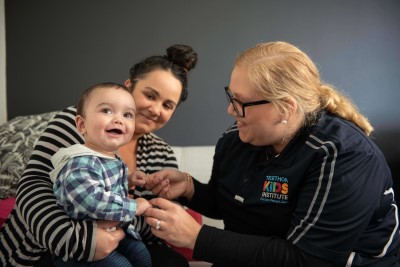Search
Showing results for "Professor"
Research
High use of complementary and alternative medication among children with autism is not associated with the severity of core symptomsThis study provided evidence for high rate of alternative medicine use in an Australian paediatric ASD population, similar to other countries.
Research
Moving beyond behaviour-only assessment: Incorporating biomarkers to improve the early detection and diagnosis of autism spectrum disordersThis paper presents a response to the Camarata (2014) lead article regarding the accuracy and effectiveness of early identification and early intervention...
Research
Molecular tools for differentiation of non-typeable Haemophilus influenzae from Haemophilus haemolyticusThe molecular approaches that have been developed for differentiation of NTHi from H. haemolyticus, with the advantages and disadvantages of each target
Research
Where were those rabbits? A new paradigm to determine cerebral lateralisation of visuospatial memory function in childrenIn the majority of people, functional differences are observed between the two cerebral hemispheres: language production is typically subserved by the left...
Research
Does cerebral lateralization develop? A study using functional transcranial Doppler ultrasound assessingIn the majority of people, language production is lateralized to the left cerebral hemisphere and visuospatial skills to the right.
Research
Genome-wide association study of autistic-like traits in a general population study of young adultsResearch has proposed that autistic-like traits in the general population lie on a continuum, with clinical ASD representing the extreme end of this...

News & Events
Perth’s Aboriginal babies show first signs of ear disease at just eight weeksThe Kids Research Institute Australia researchers have found close to 40 per cent of Aboriginal babies begin to develop middle ear infections between two and four months of age in a first of its kind study in metropolitan Perth.

News & Events
Key study unveils significant link between hospital admissions and kids with ADHDNew research from The Kids Research Institute Australia has revealed a significant link between kids with severe ADHD and higher rates of early childhood hospital admissions.
News & Events
Alarming increase in drug affected newbornsA new Australian study has found that the number of newborns suffering serious drug withdrawal symptoms is now more than 40 times higher than in 1980.
Research
Preparing for prevention: Assessing the community awareness of RSV and other childhood infectionsRespiratory Syncytial Virus (RSV) is one of the most common reasons babies are admitted to hospital – with Aboriginal and preterm infants at greatest risk.
